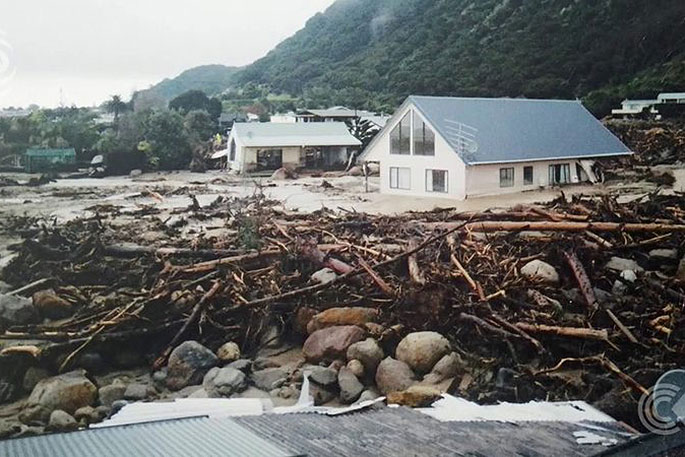Independent commissioners have released their decision supporting two proposed plan changes for a Bay of Plenty town.
The changes are aimed at avoiding loss of life on the Awatarariki fanhead in Matatā from a future debris flow event, says a statement from Whakatane District Council.
The Whakatāne District Council voted nine to two in 2017 to go through with the plan to declare the houses unliveable, 12 years after debris flow wrecked the town.
A torrential downpour washed boulders, logs and other debris down the flooded Awatarariki Stream in 2005, destroying homes and racking up a bill of $20 million.
Following a debris flow event, the council decided the Awatarariki catchment at Matata is too dangerous for people to live in and decided to move ahead with two plan changes in order to get people living in the danger zone to move.
Independent commissioners were appointed to hear submissions on the proposed changes to the Whakatāne District Council's District Plan and Bay of Plenty Regional Council's Regional Natural Resources Plan which are intended to address the unacceptably high debris flow loss-of-life risk applying to properties on the Awatarariki Stream fanhead in Matatā.
The decision will prevent future development on the fanhead area and extinguish existing use rights for those living there currently.
The Commissioners supported evidence from the Council on risk, options and the policy framework.
Whakatāne District Mayor Judy Turner says addressing the debris flow risk to residents and property owners on the Awatarariki fanhead in Matatā has been a long and difficult process.
'Many property owners have taken advantage of the opportunity provided by the voluntary managed retreat programme to start a new phase of their lives in a much safer location without the continual stress of whether or not another debris flow may occur.
'We also acknowledge that some owners retain reservations about having to leave. We trust that the years of investigation and significant effort that has gone into minimising the loss-of-life risk, and managed retreat programme are acknowledged.
'Council elected members recognise the depth of feeling Awatarariki owners have for their properties and the weight this decision carries for them.”
In their summary document, the Independent Commissioners stated a number of reasons for their decision including:
- The councils have statutory obligations to act on behalf of communities to reduce or mitigate risk to life from natural hazards.
- Whakatāne District Council's debris flow risk assessment process for the Awatarariki fanhead was robust and was carried out in accordance with industry best practice.
- Engineering solutions have been fully investigated and discounted for sound reasons.
- Catchment management and early warning systems do not provide a realistic means of reducing the current intolerable risk of loss of life from future debris flows.
- The technical assessments and peer reviews show that allowing residents to remain in their homes is not feasible.
- The wider 'community risk” of allowing residential activity to continue outweighs the perceived benefits that might accrue to those individuals who may wish to stay.
- The valuation process for the voluntary managed retreat is both robust and very fair in the circumstances. A valuation under the Public Works Act 1981 would lead to a materially worse outcome for landowners.
The District Plan change alters the zoning of 45 properties (34 of which are privately-owned) assessed as having a high loss-of-life risk and prevent any future development in the fanhead area from Residential to Coastal Protection to better reflect the risk.
The Regional Natural Resources Plan change will remove existing use rights for 18 properties and require inhabited properties to be vacated, on or before 31 March 2021.
Alongside the plan change processes, the Whakatāne District Council has been offering a voluntary managed retreat programme for the high risk area.
The Government, Whakatāne District Council and Bay of Plenty Regional Council have co-funded the managed retreat that has enabled at-risk property owners to sell their properties at market value as if the risk did not exist and relocate to a safer environment.
To date, 17 of the 34 property owners have taken up the opportunities provided by the managed retreat programme.
Submitters have the right of appeal to the plan changes through the Environment Court.
An order waiving the commencement of the 30-day appeal period has been issued by the Environment Court to coincide with the lifting of the COVID-19 Alert Level 4 for the Bay of Plenty region in order to provide submitters with the ability to obtain access to resources and advice required in connection with the lodgement of appeals.



0 comments
Leave a Comment
You must be logged in to make a comment.